But I wanted to come on to say
Happy New Year's!
I'll be back to posting soon, I think.
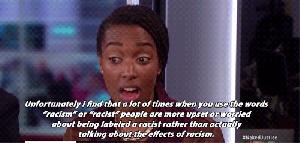
Mthembu highlighted the need to engage in open dialogue about race, despite the potential discomfort. [...] In order to have these vital conversations, Mthembu explained, “We have to allow for mistakes and forgive each other.” (MIT Black Lives Matter event)
 Jenny Holzer, My arrogance knows no bounds and I will make no peace today, and you should be so lucky to find a woman like me[/caption]
Jenny Holzer, My arrogance knows no bounds and I will make no peace today, and you should be so lucky to find a woman like me[/caption]Imagine our Amazonian future. Enjoy your vision, visage, victories. Know that loving yourself as a woman – connecting with our history – exploring our witches’ strength and creativity – know that this like all women’s work is real. (via Aria)
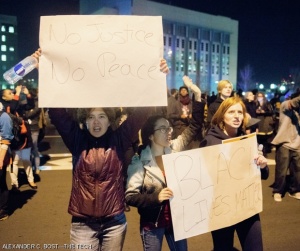 It me![/caption]
It me![/caption]People who are protesting should actually learn about about the situation and how rioting might not get them anywhere but cause more aggravation and riots itself
I'm sorry, but i think it's a little far to claim that it is a "burden" to be black in America.
1000s of lives, homes, and property have been destroyed in these riots! how terrible
Chief O’Neill said the protesters [in NYC] had not prevented ambulances or other official vehicles from responding to emergencies during the first two nights of demonstrations. No sick person, or civilian with a health emergency has been unable to get help, he said. (via Ny Times)
Police fired tear gas at a crowd of protesters who were carrying an apparently unconscious woman to safety during violent clashes in Ferguson on Monday night. (Daily Mail)
A short time later, Brown's family issued a statement asking people to keep their protests peaceful (via Fox News, Fires & Looting)
1 As news of the decision spread, protesters surged forward, throwing objects at officers in riot gear. The sound of gunfire could be heard. 2 Police officers used tear gas and smoke to disperse people who were hurling rocks and breaking the windows of parked police cruisers. A vehicle was set on fire.3 At least a dozen buildings were set on fire around the city, many in the vicinity of Ferguson Market and Liquor, the store Michael Brown was in before he was killed by Officer Wilson. (via Ny Times)
At around 1 a.m., the white mob began setting fires, mainly in businesses on commercial Archer Street at the southern edge of the Greenwood district. (via Wikipedia)
Officers responded by firing what authorities said was smoke and pepper spray into the crowd. St. Louis County Police later confirmed tear gas also was used. (Fox News)
To counter the crowds, local police have attempted to use the same techniques that security forces use around the world, including tear gas, bean bag rounds and wooden bullets. [...] In Ferguson, MO, police have attempted to disperse protesters using smoke bombs – fireworks that generate smoke after ignition. (Al Jazeera)
Although modern smoke grenades are designed not to directly emit fire or sparks, they remain a fire hazard (Wikipedia)
A report distributed today by an Idaho State Fire Marshall shows that tear gas was the source of a house fire on July 12, 2006. The canister first ignited the fabric covering and foam cushions of a couch in the residence (KHQ)
The Rosewood Massacre was a racially motivated attack on African Americans and their neighborhood committed by a white mob in Florida during January 1–7, 1923. The town of Rosewood, a majority-black community, was abandoned and destroyed in what contemporary news reports characterized as a race riot (with the implication blacks had broken out in violence (Wikipidea)
It’s depressing that we’re still dealing with these issues, but most of us are on the right side of history. Most of us. (Vanity fair)
[Stop] the senseless killing of young black voters across the United States by law enforcement. (Hands up united)
At a minimum, a feminist theory of agency must explain how it is possible for women in male-dominated societies to live in ways that reflect their genuine needs and concerns, and it must explain how it is possible for women to develop critiques of sexist social and political institutions and to mount active resistance. Moreover, it must accomplish both of those tasks without pretending that people are capable of stepping outside their own socially determined viewpoints to attain a God-like perspective. (via britannica)
Agency requires a well-developed repertoire of skills in self-discovery, self-definition, and self-direction.(via britannica)
There is no denying that there exist dispositions to resist; and one of the tasks of sociology is precisely to examine under what conditions these dispositions are socially constituted, effectively triggered, and rendered politically efficient. [...] Often forget that the dominated seldom escape the antinomy of domination. for example to oppose the school system, in the manner of the British working class 'lads' analyzed by Willis (1997), through horseplay, truancy, and delinquency, is to exclude oneself from school, and, increasingly to lock oneself into one's condition of dominated. On the contrary, to accept assimilation by adopting school culture accounts to being coopted by the institution. The dominated are very often condemned to such dilemmas, to choices between two solutions which, each from a certain standpoint, are equally bad ones (the same applies, in a sense, to women or to stigmatized minorities) (via The Purpose of Reflexive Sociology, Pierre Bourdieu and Loic J.D. Wacquant)
But it is seeming to me that race (together with racism and race privilege) is apparently constructed as something inescapable. And it makes sense that it would be, since such a construction would best serve those served by race and racism. Of course race and racism are impossible to escape; of course a white person is always in a sticky web of privilege that permits only acts which reinforce ("reinscribe") racism. This just means that some exit must be forced. That will require conceptual creativity, and perhaps conceptual violence. (via White woman feminist at Feminist Reprise)
I do not see how relations of domination, whether material or symbolic, could possibly operate without implying, activating resistance. The dominated, in any social universe, can always exert a certain force, in as much as belong to a field means by definition that one is capable of producing effects in it (if only elicit reactions of exclusion on the part of those who occupy its dominant position). (via The Purpose of Reflexive Sociology, Pierre Bourdieu and Loic J.D. Wacquant)
I'm talking about when you put your body and your mind on the line and commit yourself to years of struggle in order to change the society in which you live. (Andrea Dworkin, via DGR)
Women overestimate their own use of violence but underestimate their victimization. Woman normalize, discount, minimize, excuse their partners’ domestic and sexual violence against them. Women find ways to make it their fault.
The effect of fatherhood on females is to make [women] male -- dependent, passive, domestic, animalistic, insecure, approval and security seekers, cowardly, humble, `respectful' of authorities and men, closed, not fully responsive, half-dead, trivial, dull, conventional, flattened-out and thoroughly contemptible. Daddy's Girl, always tense and fearful, uncool, unanalytical, lacking objectivity, appraises Daddy, and thereafter, other men, against a background of fear (`respect') and is not only unable to see the empty shell behind the facade, but accepts the male definition of himself as superior. (via Solanas' SCUM Manifesto)
He blames you for the impact of his behavior.
He becomes upset and accusatory when his partner exhibits the predictable effects of chronic mistreatment, and then he adds insult to injury by ridiculing her for feeling hurt by him. If his verbal assaults cause her to lose interest in sex with him, he says, “you must be getting it somewhere else.” (p. 126) (via Is it really ABUSE?)
In contrast, men overestimate their victimization and underestimate their own violence (Dobash et al. 1998). Men are more likely to exaggerate a women’s provocation or violence to make excuses for initiating violence and, where retaliation has occurred, in an attempt to make it appear understandable and reasonable.
Earlier this week a man in a car pulled up next to a 14-year old girl on a street in Florida and offered to pay her $200 to have sex with him. [...] The girl said no. So what does this guy do? He reaches out, drags her, by her hair, into his car, chokes her until she blacks out, tosses her out of the car and then, not done yet, he runs her over several times. Bystanders watched the entire episode in shock. [...] This was an incident of street harassment taken to extremes. (via huff post)
Paul Keene, used the defence of provocation for his killing of Gaby Miron Buchacra. His defence claimed that he was belittled by her intellectual superiority and that he lost control after rowing with her by text over a twelve hour period. That a jury accepted his defence is a further example of how men’s violence is minimized and excused. Not only by men and the women they assault, but by the legal system.
- He denies what he did.
A non-abusive partner might argue with you about how you interpret something he did; an abuser denies his actions altogether (p. 128).
- He justifies his hurtful actions or says you “made him do it.”
Here the abuser is using your behavior as an excuse for his own....He says he’ll stop some form of abuse if you give up something that bothers him, which is usually something you have every right to do (p. 128). (via Is it really ABUSE?)
The right to claim abuse as a mitigating factor in domestic violence homicide cases was vitally important for women like Kiranjit Aluwahlia, Emma Humphreys and Sara Thornton, all of whom had suffered years of violence and abuse at the hands of the men they killed. That such a defence could be used in Paul Keene’s case only illustrates how differently women and men who use violence are treated.
A radical feminist perspective, based on an understanding of socially constructed gender roles and differences within the framework of patriarchal society does not mean that all men are violent to women, or that men are genetically pre-disposed to violence. It means the opposite. It means that women and men are socialized and that – within the limits of choice permitted by the social environment – we can choose to be different.
“There is nothing inherently wrong with trying to improve the conditions in which battered women live,” Meyer argues, “but when putative efforts to just 'make it better' become the end goal, the political vision and motivation to address the real exegesis of male violence becomes sublimated... The political disappears and domestic violence becomes a naturalized part of what appears to be an unchanging or unchangeable social landscape.” (Meyer 2001, p. 23). (via disloyal)
What this does is conflate rape with consensual relations and conflate the sexual abuse of a child with sex between adults. Ultimately it sends the message that it is the homosexual nature of the act that is offensive/egregious/illegal rather than the rape of a child. (via Feminist Conversation)
‘It’s harder for men to report, there’s much more of a taboo for men’
Exactly the opposite:
- men are more – not less – likely to call the police
- men are more likely – not less – to press charges
- men are less likely – not more – to drop charges (Kimmel 2002)
Another way to get round the issue of unrepresentative reporting is to look at who gets killed, dead people don’t get the choice of whether or not to inform the police. UK Homicide records between 2001/2 and 2011/12 (11 years) show that on average 5.7% (296 total) of male homicide victims and 44.2%(1066) of female homicide victims are killed by a partner or ex-partner. Expressed as an average of those killed by a partner or former partner over 11 years, 22% were men, 78% were women.
Note, the domestic homicide figures do not tell us the sex of the perpetrator, nor is the sex of the perpetrator revealed for all other types of homicide. Men are overwhelmingly killed by other men – regardless of the relationship between victim and perpetrator. Women are overwhelmingly killed by men – regardless of the relationship between victim and perpetrator (via feminist current)
Now, when I talk about a resistance, I am talking about an organized political resistance. I'm not just talking about something that comes and something that goes. I'm not talking about a feeling. I'm not talking about having in your heart the way things should be and going through a regular day having good, decent, wonderful ideas in your heart. I'm talking about when you put your body and your mind on the line and commit yourself to years of struggle in order to change the society in which you live. -Andrea Dworkin (via DGR)
Over the last few years, writing a novel on tight finances, I came to appreciate the enormous differences in the material demands between poetry and prose. As we reclaim our literature, poetry has been the major voice of poor, working class and colored women. A room of one's own may be a necessity for writing prose, but so are reams of paper, a typewriter, and plenty of time. The actual requirements to produce the visual arts also help to determine, along class lines, whose art is whose. In this day of inflated prices for material, who are our sculptors, our painters, our photographers? When we speak of a broadly based women's culture, we need to be aware of the effect of class and economic differences on the supplies available for producing art. (Audre Lorde, 1981, 116)
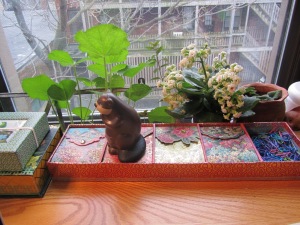 Plants in the window of my dorm room.[/caption]
Plants in the window of my dorm room.[/caption] My cat posing with the a few of the plants I had.[/caption]
My cat posing with the a few of the plants I had.[/caption]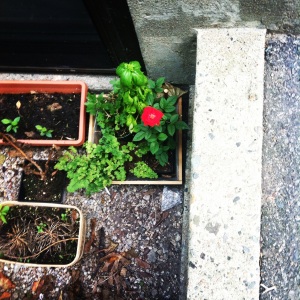 A mix of housemate and my plants.[/caption]
A mix of housemate and my plants.[/caption]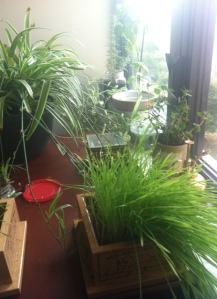 The plants in my new apartment[/caption]
The plants in my new apartment[/caption] Tea and tea pot with cookies and honey on a black kitchen tableLiving on your own[/caption]
Tea and tea pot with cookies and honey on a black kitchen tableLiving on your own[/caption]As the National Center for Women and Policing noted in a heavily footnoted information sheet, "Two studies have found that at least 40 percent of police officer families experience domestic violence, in contrast to 10 percent of families in the general population. A third study of older and more experienced officers found a rate of 24 percent, indicating that domestic violence is two to four times more common among police families than American families in general." Cops "typically handle cases of police family violence informally, often without an official report, investigation, or even check of the victim's safety," the summary continues. "This 'informal' method is often in direct contradiction to legislative mandates and departmental policies regarding the appropriate response to domestic violence crimes." Finally, "even officers who are found guilty of domestic violence are unlikely to be fired, arrested, or referred for prosecution." (via the Atlantic)
Domestic violence activists, therefore, must also challenge the racism endemic in our criminal justice system. (by Miriam Ruttenberg)
The key result was that victims were 64 percent more likely to have died of all causes if their partners were arrested and jailed than if they were warned and allowed to remain at home. The death rate was much higher among African-American victims than among whites. (via the crime report)
"Actually a survivor leaves an average of 6-8 times and each time she leaves, the violence can often escalate. Women who leave their abuser are at higher risk (75% greater risk) of being killed than those who stay. Either staying or leaving the abusive relationship poses risks to her safety. A survivor that stays in the relationship oftentimes is strategizing the best time and safest time to leave." (via Building Futures)
One example: There are as many as 2,500 "batterer intervention programs" around the nation. Shawna Andersen of the Massachusetts Parole Board reviewed all the research literature and concluded that there is no evidence that sending an abuser to such treatment is better at preventing future violence than no treatment at all. (via the crime report)
I had a volunteer internship at the Smithsonian when I was in college. There was an official program at the time (not sure about now), but living in NoVa and being a Geology major, I simply called one of the Natural History departments the summer after my freshman year and asked if anyone needed a volunteer college student to help out. And this is the part where I'm going to concede my experience is different than those who apply through official programs...the ones who applied and competed to be there. And were paid a pittance to be there. But all the other stuff - getting the experience, hoping to work there eventually - all that still applied.
Since I didn't get paid like the other interns (something I sense is rare now - the payment part that is), I didn't let myself become a doormat from the get go. I was very clear that I worked evenings in my summer job, so I could be at the museum between X a.m. - Y p.m. on A, B, and C days of the week. It made it clear that it wasn't I didn't want to spend more time there, but I was volunteering and still needed to make some green. And since I wasn't getting a parking permit, either, I had to take the Metro, so my schedule needed to be respected.
The scientists I worked with were just so happy to have some student labor - labor that was happy enough to do the routine stuff that was in many respects a waste of their time but needed actual in-person attention - they were absolutely fine with my requirements. And when I was there, I listened, learned fast, and did exactly what was asked of me.
But I was still me - I spoke my mind (politely), and made a few jokes here and there. I didn't really gossip because a lot of the work they gave me had me in closed labs, so I was usually out of the flow of things. (Memorably closed the day they had me using huge amounts of rubber cement to make a microphotography photomosaic...for 3 hours... ;) ) But I ate my lunch in the break room and got to know people. So much so that two other scientists claimed me to work in their labs when I ran out of things to do for the first scientist who took me on.
I parlayed that first phone call into a really solid relationship with several staff members, simply by setting my boundaries and doing exactly what they asked me to do. I was happy to learn and be exposed to some seriously awesome stuff - I felt that was enough. And when I applied to graduate school, I had multiple glowing recommendation letters on Smithsonian letter head - they helped push me to the top of several programs, despite coming from a good school, but an uncelebrated one. (And as a bonus, one scientist took me on a three-week research trip with his team the summer before my senior year - really advanced field work most college students don't get to do. It was awesome.)
You don't have to be a doormat. But you do have to understand that as an intern, you are there to do entry level work, and otherwise just look around and ask intelligent questions based on your observations. You are not there to change the company, and you are the lowest person on the totem pole. Doesn't matter if you're the top of your class - I was where I went to school, and it meant precisely jack shit in that environment. (Well, it did mean I was smart enough to understand what these professionals were saying, or to ask the right questions when I didn't, that's about it.)
And if you think they really are just walking all over you and actually being unfair, then you gain some knowledge, too...what to look for in a future workplace. Because you will better be able to observe office politics, even at a glance, or hear what's going on underneath any conversation you have with your interviewers.
 My cat lying on the floor (rather than one of her beds) with 3 of her toys placed on her side (and another in the background)[/caption]
My cat lying on the floor (rather than one of her beds) with 3 of her toys placed on her side (and another in the background)[/caption]Diversion and evasion are two effective means of deflecting concern or confrontation about problem behaviors. It is axiomatic that the person using these tactics has no intention whatsoever of taking responsibility for a behavior or of considering changing it. Rather than be accountable and responsible, what the issue-dodger and subject-changer really wants to do is to advance their own agenda at the expense of yours while simultaneously managing your impression of them.
Many times, attention is shifted toward the person trying to bring a problem behavior to light, thus effectively not only throwing that person on the defensive, but also prompting them to lose focus and become derailed in their pursuit of their own agenda.
If you try to confront an issue head on, a person who wants to manipulate you will do their best to side-step the issue. Evading a matter of central concern is a great way not only to dodge responsibility, but also to keep the light of illumination from shining on the behavior needing attention.